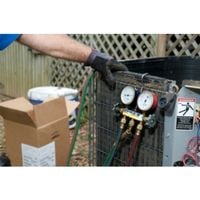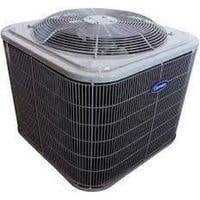Troubleshooting carrier air conditioner. Despite Carrier’s reputation for reliability and the warranty it offers, you may encounter problems that prevent the air conditioner from functioning properly.
There are issues, however, that can be identified as ones that may require a service call.
For example, if the unit is emitting warm air or struggling to keep up with cooling demands, the equipment may have developed a problem that isn’t within your means of resolving.
Troubleshooting carrier air conditioner

Here we will discuss some common issues and solutions for Troubleshooting carrier air conditioners.
Fan Is Defective
The dual shaft fan motor can be faulty. The dual shaft fan motor utilizes two blades to either side of the motor.
one which draws in outside air over the condensing coil to dissipate the heat.
Whilst the other directs warm air around the evaporator coil. If these bearings are loose or if they won’t move at all, don’t use them anymore.
In order to see if the motor is working or not, simply turn it in by hand. If it does not budge at all, this indicates that the motor bearings are worn out and most likely need replacing.
If you can turn it by hand with ease, try plugging it into an outlet to see if power is reaching that specific area.
If you can’t get the device to turn on at any point then this could indicate that the device needs a new motor replaced.
Remote Control Failure
First, try replacing the batteries in your remote control. If installing fresh batteries doesn’t solve the issue and you can still operate your air conditioner manually.
It’s possible your remote is defective. If you think your remote is defective, replace it with a new one.
Infrared signals from the remote are received by the main board’s infrared receiver. The remote control will not be able to communicate with the control board if the infrared receiver is not working.
Sometimes won’t turn off
Air conditioners can’t effectively clean the air if the condenser coils are dirty. When debris accumulates on the coils, the air conditioner will become less efficient, causing it to work harder to cool the room.
If there is too much dirt and debris stuck on your unit’s condenser coils, the air conditioner won’t be able to maintain a comfortable temperature for you or your family, and your system may overheat and short out completely.
The thermostat is a special part of the air conditioner which constantly monitors temperature. When it rises above the setpoint, the thermostat activates certain operations to keep the temperature low.
If the thermostat breaks down, it will power up the compressor when needed – but this can result in the continuous operation of that device.
Air conditioner Make Noise
When a compressor starts to wear out, it creates more noise than usual. When this happens, it may not be necessary to replace the compressor many compressors tend to last for years after they have been infused with a lifespan of additional noise.
The dual-shaft fan motor has lubricated bearings that can wear down over the years, becoming noisy and causing the fan to shake. In such a case, replacing the motor is recommended.
Air conditioners have a fan blade in the front and another at the rear. Both of them usually move steadily, since not much is going on there.
You check for any jams or damage that might prevent normal movement. If either one is faulty, you should replace it right away as that could cause all sorts of problems down the line.
Not Proper Cooling
If the air filter is clogged, it becomes difficult for enough cool air to flow through your air conditioner.
The result of this can be that your system may not be able to produce cold temperatures as efficiently as before.
In addition to this, if the air filter is clogged and can’t be properly cleaned, then frost will begin to build upon your evaporator coils.
If this continues for long periods of time, it may cause permanent damage to your filters so always do what you can to make sure the air filter stays clean!
The compressor may be defective. However, this is usually not the case. Before replacing the compressor.
Check additional components that are much more commonly broken particularly a defective overload protector or a defective compressor capacitor.
Related Guides
